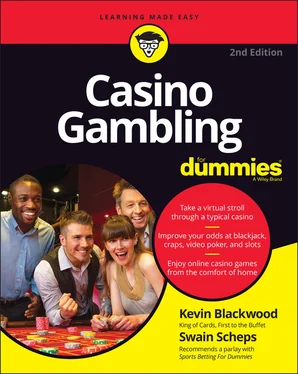Riverboat casinos: A piece of the past
New laws and regulations have revived an icon from America’s colorful past — riverboat casinos. Although these contemporary vessels bear little resemblance to the fabled paddleboats that plied the Mississippi, gambling fun is still rollin’ on the river.
Most casino voyages are “cruises to nowhere” that last one to three hours. Some floating casinos don’t even leave the dock, but they’re in compliance with state gambling laws because they’re on the water. Typically, these casinos are smaller than the big boys in Vegas and aren’t always open 24 hours, but they usually offer most of the same games.
Cruise ships: Sailing for international waters
What could be finer than cruising off the coast of Carolina? Okay, maybe cruise ships don’t hit those waters often, but they do sail nearly everywhere in the world, including hot spots (like the Caribbean and the Panama Canal) and scenic destinations (like Alaska and Mexico).
Nearly every cruise line takes advantage of international waters (where gambling is legal) by offering casinos onboard their ships (open only during certain hours and only when the ship is in international waters). These casinos have most of the same games and similar odds as regular land-based casinos (with a few differences), so if you don’t mind your dice rolling funny when a big wave hits, cruising may be just the ticket for you.
Tribal gaming: Cashing in on less bling
A 1988 law paved the way for tribes to legalize gaming inside states that otherwise had no casino presence. Since then, a cascade of reservation-based casinos have opened and dramatically changed the landscape of casino gambling across the country. Today, 30 states have some form of tribal gaming. Oklahoma and California have dozens of casinos, ranging from full-service megaresorts to truck stops with slot machines. Most major cities in the United States are a short drive away from a tribal gambling location.
Tribal gaming generates billions of dollars in revenues every year and provides significant competition for more traditional gambling destinations. In fact, the combined gaming revenue of all tribal casinos constitutes about half of all gaming revenue in the U.S.
Native American casinos typically offer the same machines and table games that other gambling capitals have. However, many don’t allow alcohol consumption and have betting limits that are lower than you’d expect in Las Vegas or Chicago. Nevertheless, the success of tribal gaming speaks volumes about the quality of the casinos. So, if you can live without exploding volcanoes, fancy fountains, and cocktails, you’re bound to enjoy the friendly, less spectacular tribal casinos (see Chapter 19).
Beyond the borders: Gambling abroad
If you feel stuck in a gambling rut, traveling abroad for gaming may just be the adrenalin shot you need. Most foreign casinos offer the same or similar games as casinos in the United States, with little twists and bits of flare that just might prompt you to write a postcard to a friend about it. Canada and the Bahamas have some of the best casinos on this continent. Or, if you’re looking for something more exotic, check out Macao or the South of France.
 But customs differ around the world, so you may be surprised at the rules across the pond. Many European casinos charge an entry fee, and many of them require more-formal attire. (Pack a coat and tie or evening dress if you plan on playing in Europe.) Travelers should also be aware that the American traditions of megacasinos and multithousand-room resorts are rare overseas.
But customs differ around the world, so you may be surprised at the rules across the pond. Many European casinos charge an entry fee, and many of them require more-formal attire. (Pack a coat and tie or evening dress if you plan on playing in Europe.) Travelers should also be aware that the American traditions of megacasinos and multithousand-room resorts are rare overseas.
Gambling and cyberspace seem to be made for each other. Through the conduit of the Internet, casinos and gaming companies can invite themselves directly into the homes of gamblers. People can play anonymously and comfortably, without ever leaving the house.
Considered the last frontier for gaming, cyberspace has now been settled — if not fully tamed. Online gaming (check out Chapter 17) represents a multibillion-dollar industry worldwide that continues to grow exponentially every year. In spite of its convenience and fun, however, online gambling has two serious drawbacks.
The whole casino experience is missing. You don’t have any table camaraderie, shows, restaurants, or cocktail servers for variety and entertainment. The purists may not care, but many people gamble for the experience as much as for the game itself.
Quality, reliability … and honesty vary. While many states license and regulate online gaming, residents of those that don’t might be drawn to offshore casinos that aren’t subject to uniform standards for customer service, fair play, or financial stability.
 Internet gambling has serious temptations for the undisciplined player. You can wager and play — and lose — at a breakneck pace when gambling online. And you don’t have the typical safety checks, like a companion who urges you to stop throwing good money after bad.
Internet gambling has serious temptations for the undisciplined player. You can wager and play — and lose — at a breakneck pace when gambling online. And you don’t have the typical safety checks, like a companion who urges you to stop throwing good money after bad.
Measuring Your Gambling IQ
As you’ll learn throughout this book, people who find the greatest pleasure in gambling do so with
Realistic intentions
An understanding of the odds
An informed strategy
Some skill, depending on the game
To paraphrase the character Tevye in Fiddler on the Roof, it’s no great shame to lose at gambling — but it’s no great honor, either. Gambling can be a fun experience whether you win or lose … but it’s a lot more fun when you win.
In that spirit, the book aims to arm you with the understanding and knowledge you need to maximize your enjoyment and success at casino gambling. Before you take a step into a casino, here are ten quick questions to measure your grasp of gambling and the world of casinos. If you answer them all correctly, congratulations! And if not? Don’t worry; after you read Casino Gambling For Dummies, you’ll ace this test — and the many gambling experiences you encounter in the future.
1 To come out ahead overall at sports betting, you need to win approximately50 percent of the time.53 percent of the time.20 percent of the time.
2 You’re playing Annie Duke at the final table of the World Series of Poker. She makes a big bet and then starts blinking her eyes rapidly. Is sheFlirting with you?Having contact problems?Bluffing?
3 At which game would you lose more per hour (on average)?Playing a 25¢ Double Diamond slot machinePlaying $1 video pokerPlaying single-deck blackjack for $100 a hand
4 You’re at the roulette table, and a black number has come up five times in a row. What are the odds that the next number will be red?47.3 percent75 percent50 percent
5 How many states have legalized gambling?48522
6 Players who bet on the pass line in craps are hoping the first roll is a12Yahtzee7
7 What is the minimum number of innings required for an over/under baseball bet to be official?28½4½
8 Video poker is adapted from what poker game?Texas Hold’emStrip pokerFive-card draw
9 Which of these games can you play while in the bathroom?KenoBingoSlots
10 Where is the biggest casino in the world currently located?MacaoOklahomaNevada
1 B. In sports betting, a gambler needs to win approximately 52.4 percent of their bets to break even because the house charges a commission (or vigorish ) on every bet.
Читать дальше

 But customs differ around the world, so you may be surprised at the rules across the pond. Many European casinos charge an entry fee, and many of them require more-formal attire. (Pack a coat and tie or evening dress if you plan on playing in Europe.) Travelers should also be aware that the American traditions of megacasinos and multithousand-room resorts are rare overseas.
But customs differ around the world, so you may be surprised at the rules across the pond. Many European casinos charge an entry fee, and many of them require more-formal attire. (Pack a coat and tie or evening dress if you plan on playing in Europe.) Travelers should also be aware that the American traditions of megacasinos and multithousand-room resorts are rare overseas. Internet gambling has serious temptations for the undisciplined player. You can wager and play — and lose — at a breakneck pace when gambling online. And you don’t have the typical safety checks, like a companion who urges you to stop throwing good money after bad.
Internet gambling has serious temptations for the undisciplined player. You can wager and play — and lose — at a breakneck pace when gambling online. And you don’t have the typical safety checks, like a companion who urges you to stop throwing good money after bad.










